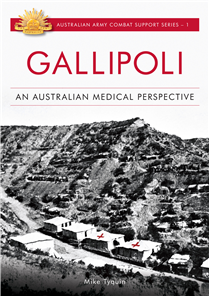Description
Title: Gallipoli – An Australian Medical Perspective
Author: Tyquin, Michael
Condition: Mint
Edition: 1st Edition
Publication Date: 2012
ISBN: 9781921941863
Cover: Soft Cover without Dust Jacket – 140 pages
Comments: The history of the Army Medical Services (AMS) at Gallipoli.
To be successful, a modern army needs logistical support to survive – to arm, feed, transport, and care for its soldiers. As history shows us the maintenance of health in any army , is a key factor in warfare.
When Australia entered the First World War in 1914, the Army Medical Services (AMS) had only recently been brought together after the federation of the Australian colonies in 1901. Like the rest of the 1st Australian Imperial Force (AIF), the AMS was largely an untested organisation of volunteers based on a small cadre of professionals. The prime function of the AMS was to maintain fit and healthy troops at the front or during operations, and to return the sick and injured to duty as soon as possible.
In many respects the Gallipoli campaign was a doomed undertaking. The seeds of ultimate defeat in December 1915 were the risks that attended a hugely ambitious, complex, and large-scale amphibious operation – the landings on well-defended shores on the Gallipoli peninsula, under cover of darkness. Communications at the time were primitive, while general staff officers had little understanding of their own army’s medical assets or the needs of a largee medical organisation.
Our allies, who shared many of the same privations, came from the British, New Zealand, Indian, and French armies. The Australian Army Medical Corps (AAMC) received aid from, and gave support to, all five forces at various times during 1915. This aspect of what we would now recognise as coalition support worked well for most of the campaign.
Underlying the execution of the Dardanelles campaign were factors wholly outside the control of the Australian AMS. Undoubtedly tragic, and sometimes avoidable, errors were made at the highest level of command, with subsequent pressures on the AMS. An amphibious operation of this type and scale, however, was without parallel in modern military history, and mistakes were inevitable, as they are with any campaign of such complexity.
Gallipoli An Australian Medical Perspective explores these complexities and mistakes through the eyes of the infant Australian Army Medical Corps.




